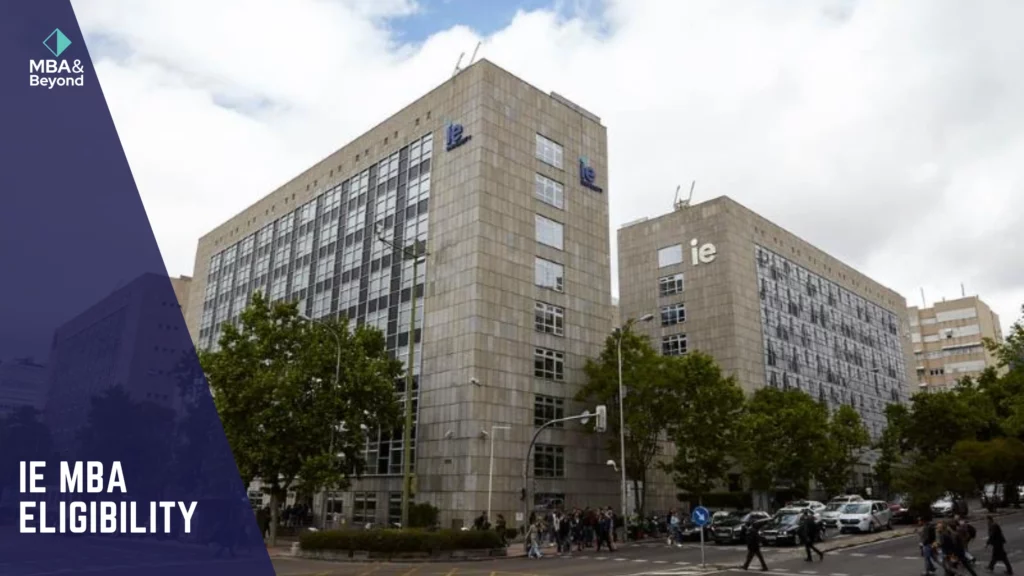IE MBA Eligibility: Process & Fees

IE Business School stands out as a beacon of excellence, attracting ambitious professionals from across the globe. Nestled in the vibrant city of Madrid, Spain, IE offers an MBA program renowned for its innovative curriculum, diverse student body, and strong focus on entrepreneurship and social responsibility. For study abroad aspirants dreaming of catapulting their careers to new heights, understanding the eligibility criteria for such a prestigious program is the first step toward turning those dreams into reality. This blog post aims to demystify the IE MBA eligibility criteria, ensuring that prospective students have a clear roadmap to prepare their applications effectively.
Understanding IE MBA Eligibility Criteria
The journey to joining IE Business School’s transformative MBA program begins with a thorough understanding of its eligibility criteria. IE seeks to foster a dynamic learning environment by selecting a diverse group of individuals who not only meet but exceed the basic requirements. At the core, the eligibility criteria are designed to assess an applicant’s academic background, professional achievements, and potential for leadership.
- Academic Qualifications: Applicants to the IE MBA program must hold an undergraduate degree from an accredited institution. While the field of study is not restricted, the admissions committee looks for candidates who have demonstrated academic excellence and a capacity for rigorous analytical thinking. The school does not specify a minimum GPA; however, the competitive nature of the admissions process means that higher academic standings improve prospects.
Professional Experience Requirement
IE Business School values diversity and real-world business acumen, which is reflected in their MBA candidate selection. Although specific work experience requirements were not detailed, it’s clear that the program is designed for ambitious professionals looking to advance their careers. The curriculum is tailored for dynamic professionals, mixing cutting-edge technologies with dynamic course content to prepare for today’s fast-paced business world. This implies that applicants should have relevant professional experience that enables them to contribute to and benefit from the program’s collaborative and diverse learning environment.
Language Proficiency
For non-native English speakers, demonstrating proficiency in English is a must for the IE MBA program. While specific test scores were not provided, typically, standardized English language tests such as the IELTS, TOEFL, Cambridge Advanced, or Duolingo English Test are accepted. Exceptions to this requirement might be made for candidates who have completed their undergraduate degree in English or have lived or worked in an English-speaking environment for an extended period. This ensures that all participants can fully engage with the program’s English-medium instruction.
GMAT/GRE Scores
The IE MBA application process includes the option for candidates to submit GMAT or GRE scores, or alternatively, take the IE Global Admission Test. This flexibility allows applicants to choose the test that best showcases their abilities. The inclusion of the IE Global Admission Test as an option suggests a holistic approach to admissions, considering various aspects of a candidate’s profile beyond standardized test scores.
Additional Insights
IE Business School’s MBA programs, including the International MBA, are tailored for professionals at different stages of their careers, offering a range of full-time and part-time programs. The International MBA in Madrid is highlighted for its intense curriculum and real-world learning environment, designed to transform participants into transformational leaders. This suggests that the admissions process is comprehensive, seeking candidates who can thrive in and contribute to such an environment.
The admissions process is holistic, involving several steps, including the submission of an online application with various documents, an online assessment, an entrance exam (IE Global Admission Test, GMAT, or GRE), a personal interview, and a final decision by the Admissions Committee. This thorough process underscores the importance of not only meeting the eligibility criteria but also demonstrating the potential for leadership, a willingness to engage in a transformative educational experience, and the ability to contribute positively to the IE community.
Additional Requirements
Beyond the academic qualifications, professional experience, and test scores, IE Business School seeks candidates who bring more to the table. A well-rounded application includes several additional elements that can significantly impact your chances of admission:
- Interviews: An integral part of the IE MBA admissions process, interviews are conducted to understand the candidate’s personality, motivations, and potential fit with the school’s culture. This personal interaction allows the admissions committee to gauge your communication skills, leadership potential, and how you might contribute to the diverse IE community.
- Essays: Applicants are usually required to submit essays or personal statements. These written pieces provide a platform to showcase your individuality, career aspirations, and reasons for choosing IE Business School. It’s your opportunity to highlight how your experiences, both professional and personal, have prepared you for the challenges and opportunities of an MBA.
- Letters of Recommendation: Recommendations play a crucial role in providing an external perspective on your capabilities and achievements. IE typically asks for letters from individuals who can comment on your professional accomplishments, leadership skills, and personal character. Choosing the right recommenders who know you well and can provide specific examples of your strengths can significantly impact your application.
- Extracurricular Activities and Leadership Skills: Involvement in extracurricular activities, volunteer work, or leadership roles in professional or community organizations demonstrates your initiative, teamwork, and ability to impact your environment. IE values applicants who show a commitment to personal growth and social responsibility, as these qualities align with the school’s mission to develop leaders who can make a positive difference in the world.
Application Process Overview
The journey to becoming part of IE’s MBA program involves several steps designed to ensure that candidates are a good fit for the rigorous and collaborative learning environment IE is known for:
- Online Application Form: Start by filling out the online application form, which includes personal information, educational background, professional experience, and other relevant details.
- Online Assessment: After submitting the online application, candidates undergo an online assessment that includes video and written responses. This step helps the admissions team get a better sense of your personality and communication skills.
- Entrance Exam: Candidates must either take the IE Global Admission Test or submit a GMAT or GRE score. This requirement assesses your analytical and quantitative abilities, critical for success in the MBA program.
- Personal Interview: A key component of the application process, the interview can be conducted face-to-face or online. It allows the admissions team to delve deeper into your experiences, aspirations, and suitability for the program.
- Admissions Committee Final Decision: After the interview, your entire application is reviewed holistically by the Admissions Committee. This comprehensive review considers all aspects of your application to make a final decision.
The IE MBA admissions process is designed to identify candidates who are not only academically capable but also bring diverse perspectives, leadership potential, and a commitment to making a positive impact. Preparing thoroughly for each step and presenting a cohesive, authentic picture of your experiences and aspirations is key to a successful application.
Conclusion
Embarking on the IE MBA journey is a transformative experience that goes beyond acquiring business acumen; it’s about becoming a part of a global community that values innovation, diversity, and leadership. The IE MBA eligibility criteria for MBA program are designed to identify individuals who are not only academically capable but also bring a wealth of professional experiences, leadership skills, and a visionary approach to their careers. By understanding and meticulously preparing for each aspect of the eligibility and application process, you position yourself as a strong candidate for this prestigious program.
As you reflect on the eligibility requirements, from academic qualifications and professional experience to language proficiency and test scores, remember that IE is looking for more than just numbers on a paper. They seek individuals who are eager to engage in a rigorous academic environment, contribute to a diverse and dynamic community, and lead with integrity in the global business landscape. Your application is your opportunity to showcase not only your achievements but also your potential to make a meaningful impact in the business world.
Frequently Asked Questions
1.
What is the application process for the IE MBA
The application process for the IE MBA includes the submission of an online application, which consists of academic records, a resume, essays, and letters of recommendation. Applicants must also provide their GMAT, GRE, or IE Global Admissions Test (ieGAT) score, followed by an interview if shortlisted.
2.
Are scholarships available for the IE MBA program
Yes, IE offers a variety of scholarships and financial aid options. These are merit-based, need-based, or focused on specific profiles, such as women leaders or entrepreneurs. Applicants can apply for scholarships during the application process by submitting the necessary financial documentation.
3.
What is the language requirement for the IE MBA
The IE MBA is offered in English and requires proficiency in the language. Non-native speakers need to provide proof of English language proficiency, such as TOEFL or IELTS scores, unless they have completed prior education in English or have significant professional experience in an English-speaking environment.




Leave a Reply